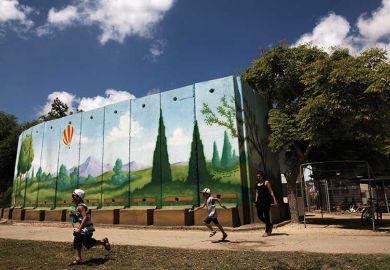Aspirational students from India are willing to endure many challenges to get a degree from an international university. These include high tuition fees, restrictive visa applications and even casual racism.
An international education is a golden ticket to well-paid professional jobs that would otherwise go to family-connected “networkers”, able to bypass the traditional interview process. It is a running joke in India that employers would hire an applicant from the most obscure UK university over a graduate from India’s top institute. That is why, in 2015, some 350,000 Indians went to study abroad.
However, that high number hides the fact that international higher education remains a relatively niche activity. After all, 50 per cent of India’s billion citizens are below the age of 25: millions would attend overseas universities if they had the financial means.
The barriers to an international education are not just economic, however. Onerous immigration policies are also a problem. The UK, for example, requires international applicants to have large sums of cash in the bank, to prove they can live without recourse to paid work. And “scholarship letters” are not recognised as proof of funds. I was awarded the prestigious Centenary Scholarship to pursue a master’s degree at the UCL Institute of Education but was almost forced to refuse it. I had to run from pillar to post to arrange to receive an exorbitant sum of money that I didn't even need.
When my account of this was published on Vagabomb, a viral content website akin to BuzzFeed, I was deluged with emails from Indians who had faced similar challenges. Another common resentment was the UK’s requirement for international students to retake English language proficiency tests every two years. And such linguistic and aptitude tests are only one aspect of the incredibly convoluted process of applying to universities. Many students from poorer schools, without access to influential networks, have no idea how the process works, or what their options are.
The definition of academic potential used by universities and funders is also restrictively narrow. In India, most national scholarship programmes display a clear preference for candidates who tick the standard boxes of high exam grades and CVs studded with eye-catching work experience and academic publications. But these criteria exclude scholars from non-traditional backgrounds, such as community leaders, nomadic groups or other minorities who could demonstrate their potential in a different setting.
All this amounts to the systemic exclusion of poorer people from the developing world. To redress it, wide-ranging and radical action is needed, both in India and abroad.
Educational organisations, schools and alumni networks must address the lack of information available to applicants. Educationalists and activists should lobby governments to develop needs-sensitive immigration policies for international students. Funding organisations should be pushed to reform their outdated selection policies. Interest-free government loans for education and more research fellowships and graduate schemes could make life easier for young Indian scholars – particularly humanities and social science students, who are rarely granted bank loans because they lack lucrative job prospects. Such schemes could also incentivise them to return to India.
The corporate sector could also do more. It currently remains a largely untapped source for higher education funding, but industry-backed scholarships for promising students in need of financial assistance would be a win-win.
I learned how the “system” works the hard way, by trying to beat it. People said that I did beat it because, as a middle-class girl with almost zero financial resources, I won a coveted scholarship to a world-leading school of education. But I doubt that. I had fluent English speaking skills and a bachelor’s degree from one of Asia’s top universities. That made me part of an influential social circle.
Even so, I still found it hard to negotiate the application and funding landscape. Contrast that with the situation of a young person from rural India with none of the advantages I enjoyed. For them, the concept of equality of opportunity to international higher education industry is truly a myth.
Rudrani Dasgupta works for ActionAid in Kolkata, India. In 2015-16 she won a Centenary Scholarship to study for a master’s in the sociology of childhood and children’s rights at UCL.
POSTSCRIPT:
Print headline: International frontiers
Register to continue
Why register?
- Registration is free and only takes a moment
- Once registered, you can read 3 articles a month
- Sign up for our newsletter
Subscribe
Or subscribe for unlimited access to:
- Unlimited access to news, views, insights & reviews
- Digital editions
- Digital access to THE’s university and college rankings analysis
Already registered or a current subscriber?








